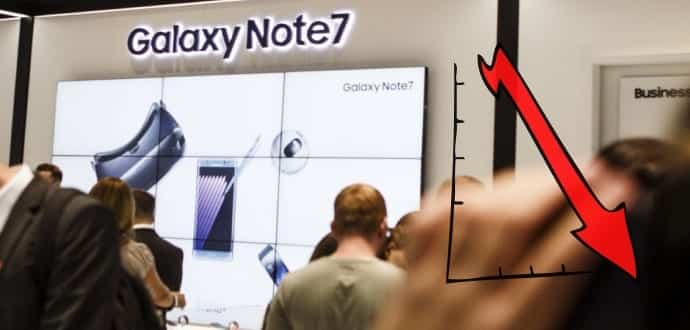Samsung shares plunge down on Note 7 fire warnings
Samsung which had launched its premium smartphone Galaxy Note 7 on August 19, 2016 was globally recalled in early September following reports of the device catching fire and exploding due to defective batteries. Further, the South Korean giant advised consumers to stop using its Galaxy Note 7 and “immediately participate” in a replacement programme, following more reports of smartphones catching fire.
The advisory came after the U.S. Consumer Product Safety Commission (CPSC) recommended last Friday that consumers stop using the smartphone and major airlines globally banned use during flights. Note 7s with new batteries are due to become available on September 19.
With an estimated 2.5 million Galaxy Note 7 units sold, analysts say the recall could cost Samsung as much as $5 billion in revenue. Shares have plunged 11 percent since Friday and the company has lost $22 billion of market value, which is the largest two-day decline in eight years, according to Bloomberg.
“The notion is that this could have great impact to the Samsung brand almost immediately. Where we could not see not the long term degradation around the notion of safety around what is a Samsung product, but the immediate reaction where the users of the devices can’t use the devices anymore,” Bloomberg’s editor Corey Johnson said.
Samsung’s brand could go well beyond the early estimates of $1 billion for a single product’s recall looking at the damage caused due to drop in stock prices. In the past, the company has spent huge amount on marketing its name, and had hoped to get an advantage on Apple Inc. by launching its device weeks before the new iPhones hit the market. However, it looks like that the advantage has now disappeared.
“Samsung’s nightmare is just getting worse and worse,” said Bryan Ma, vice president of devices research for IDC. Instead of isolating Note 7s, it is likely that airlines may decide to ban all Samsung smartphones given the difficulty of differentiating between models. “If true, then the Note 7 could end up dragging down the rest of the portfolio.”
The U.S. Consumer Product Safety Commission and Samsung are in talks on an official recall of the devices as soon as possible. Almost all CPSC recalls are done voluntarily in conjunction with a company and the scope of any action on the Note 7 may be identical to what Samsung has already suggested to consumers. But once the agency becomes involved, it triggers additional protections for people. For example, U.S. law prohibits the sale or resale of any recalled item once CPSC acts.
“The uncertainty over the Note 7 recall has grown following the tough reactions from the U.S.,” said Lee Seung Woo, an analyst at IBK Securities Co. in Seoul. “Samsung has to settle this situation as early as possible by replacing every Note 7 device in order to reassure customers. In the worst case scenario, Samsung may have to consider discontinuing Note 7 sales for a time.”
Following warnings from aviation regulators in several countries and airlines, the CPSC advisory has issued the advisory.
“The market certainly thinks this is going to cost more than $1 billion,” said Anthea Lai, an analyst with Bloomberg Intelligence. “You have to persuade normal consumers that they should try to convince airlines and guards that these phones are now okay. Most people are just not going to bother. They’ll want new phones.”
Source: Bloomberg

